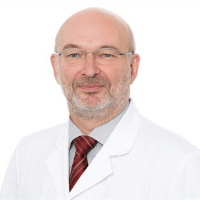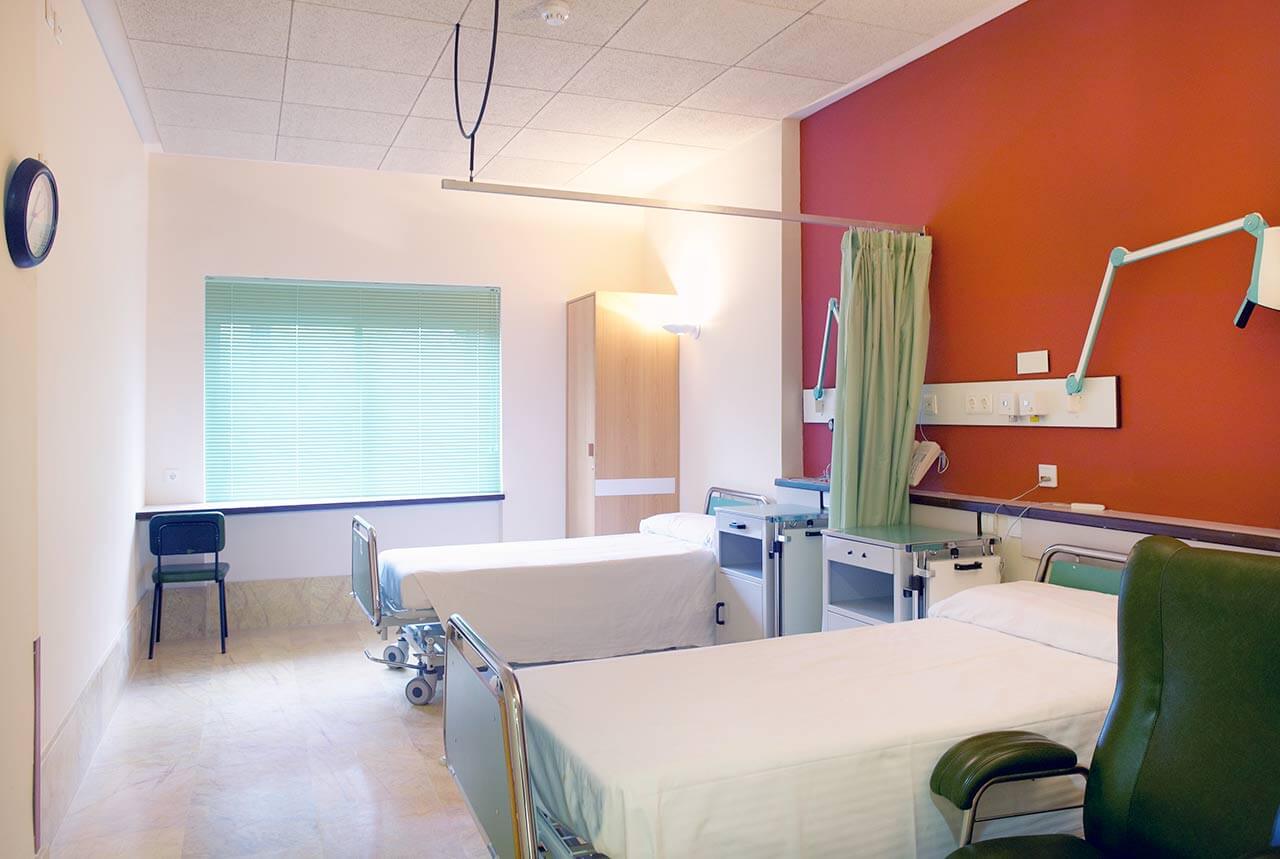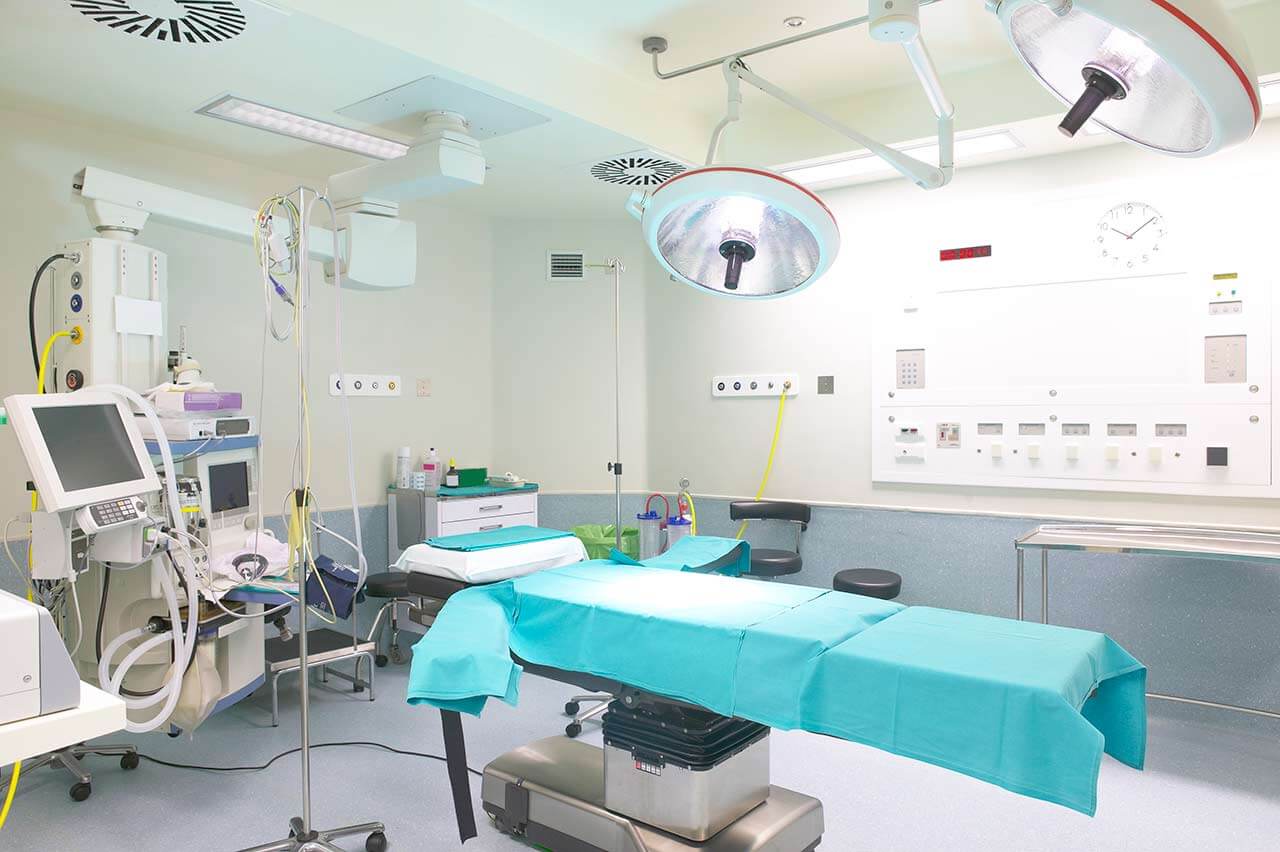
The program includes:
- Initial presentation in the clinic
- clinical history taking
- review of medical records
- physical examination
- laboratory tests:
- complete blood count
- general urine analysis
- daily urine analysis
- biochemical blood test
- inflammation markers (CRP, ESR)
- blood coagulation analysis (aPTT, PT, INR)
- immune tests
- ultrasound examination
- CT/MRI scan
- kidney vessels MR angiography
- kidney biopsy under CT control with histological study
- nursing services
- consultation of related specialists
- treatment by head doctor and all leading experts
- full hospital accommodation
- explanation of individual treatment plan
Required documents
- Medical records
- Creatinine and urea blood levels, eGFR assessment (if available)
Service
You may also book:
 BookingHealth Price from:
BookingHealth Price from:
About the department
The Department of Nephrology at the Hospital Cologne-Merheim provides diagnostics and treatment for the full range of kidney diseases, including kidney lesions due to arterial hypertension and systemic autoimmune diseases such as systemic lupus erythematosus, Wegener's granulomatosis, Goodpasture syndrome, and others. The department's specialists conduct all types of renal replacement therapy (dialysis) for patients with acute and chronic kidney failure. The department has 80 beds for inpatients and also houses specialized outpatient clinics. The department's kidney transplant program involves close cooperation with the Transplant Center Cologne, which, in turn, cooperates with the University Hospital Cologne. The center is one of the largest German medical facilities where kidney transplant surgery is actively performed. Nephrologists are responsible for the care of patients before and after kidney transplant surgery, while specialized surgeons are in charge of the kidney transplant itself. The department's patients undergo intensive therapy in a modern specialized unit whenever required. The highly competent team of doctors takes care of the patients' health. The specialists have all the necessary resources to provide patients with effective treatment in a comfortable environment. The Head Physician of the department is Prof. Dr. med. Achim Jörres.
The department has been the Center of Excellence for Kidney Disease in the Cologne region for many years. The department treats more than 2,500 inpatients with acute and chronic kidney diseases every year, with approximately half of the cases involving acute or chronic kidney failure. The department's medical team is proud of its successful experience in treating both primary kidney diseases (for example, glomerulonephritis or pyelonephritis) and secondary kidney diseases (for example, diabetic nephropathy or toxic nephropathies). In addition, the doctors specialize in the treatment of rare kidney diseases, such as hereditary nephropathies (Alport syndrome or autosomal dominant polycystic kidney disease), vasculitis (Goodpasture syndrome or Wegener's granulomatosis), lupus nephritis, and nephropathy caused by hantavirus infection. A treatment regimen is developed taking into account the diagnosis, specificities of the pathology, severity of its course, the patient's general health condition, and other factors. In many cases, the first-line treatment is drug therapy with various groups of drugs in combination with a diet. In more complex cases, dialysis may be required, and the last-line treatment is a kidney transplant.
The department has been providing renal replacement therapy since 1996, maintaining consistently high-quality medical services in this field. Dialysis procedures are carried out in a modern unit with 24 beds. Approximately 10,000 dialysis procedures are performed here every year, including about 2,000 for critically ill patients in intensive care units. Patients with infectious diseases, such as hepatitis B and staphylococcus aureus infection, undergo dialysis in an isolated room.
The department's nephrologists also specialize in caring for patients before and after kidney transplant surgery. When providing medical care to patients who require kidney transplant surgery, the department's doctors cooperate closely with transplant surgeons, who perform about 70 kidney transplants annually. The specialists from the Institute for Transfusion Medicine are involved in immunological tests required for transplant preparation. The final decision on the advisability of kidney transplant surgery is made during interdisciplinary boards, considering comprehensive diagnostic results, including laboratory tests, ultrasound scans, imaging tests, heart function assessments, pulmonary function tests, etc. During the donor search phase, compatibility tests are also performed to avoid rejection of the transplanted organ. Following kidney transplant surgery, the patient spends several days in the intensive care unit under constant medical supervision. Subsequently, the patient is transferred to a regular ward and receives the necessary drug therapy, in particular immunosuppressive therapy, antibiotics, antiviral drugs, painkillers, etc. Prior to discharge from the hospital, the patient receives recommendations on further drug therapy, diet, physical activity, and the cessation of bad habits.
The department's main therapeutic options include:
- Drug therapy
- Renal replacement therapy (dialysis)
- Hemodialysis
- Peritoneal dialysis
- Continuous veno-venous hemofiltration
- Plasmapheresis
- Immunoadsorption
- Hemoperfusion
- High-flow hemodialysis
- Permanent ambulatory peritoneal dialysis
- Dialysis access formation (in cooperation with surgeons)
- Permanent dialysis catheter placement
- Duplex ultrasonography as preoperative diagnostics and assessment of shunt patency
- Angiography to assess the state of the great blood vessels
- Balloon dilatation and stent implantation for dialysis shunt stenosis
- Comprehensive preparation for kidney transplant surgery and postoperative care
- Intensive care for patients with kidney diseases
- Other medical services
Curriculum vitae
Prof. Dr. med. Achim Jörres graduated from the Free University of Berlin. After his graduation, he worked as a Research Fellow. In 1989, the doctor defended his thesis, and in 1997 he had his habilitation in Internal Medicine at the Charite Faculty of Medicine. He worked as a Senior Physician in the Department of Nephrology at the Charite University Hospital Berlin. In 2003, he was appointed as Professor for Nephrology and Renal Replacement Therapy at Charite, and a year later, he was appointed as a Managing Senior Physician and Deputy Head of the Department of Nephrology in Charite. From 2009 to 2016, Prof. Achim Jörres worked as Acting Head of the Department of Nephrology at the Charite University Hospital Berlin. Since April 2016, the doctor has been heading the Department of Nephrology at the Hospital Cologne-Merheim.
Photo of the doctor: (c) Kliniken der Stadt Köln gGmbH
About hospital
According to the reputable Focus magazine, the Hospital Cologne-Merheim ranks among the top German medical centers!
The health facility is an academic hospital of Witten/Herdecke University, which gives patients access to the very latest developments in European medicine. The Hospital Cologne-Merheim positions itself as a maximum care medical center, which is why it offers a wide range of high-quality medical services. The hospital has 752 beds in 13 specialized departments. More than 28,000 inpatients are treated here every year. Outpatient care is also provided for many medical specialties. The hospital also collaborates closely with the University Hospital Cologne, carrying out fruitful work at the Transplant Center.
The most successful areas of clinical practice in the medical center are neurosurgery, pulmonology, transplantology, surgery (in particular, minimally invasive), cardiology, traumatology, joint replacement surgery, and plastic surgery. The Departments of Ophthalmology, Anesthesiology, Radiology, Neuroradiology, and Palliative Care are also distinguished by top-class medical service. In addition, the Departments of Neurology and Neurosurgery provide effective early rehabilitation programs for patients with stroke, traumatic brain injuries, brain tumors, and other neurological diseases. Comprehensive treatment of such a level is available only at highly specialized and best medical facilities in Germany.
The hospital has several ultramodern intensive care units, where patients in critical condition are treated.
It is worth noting that the hospital was the first in the region to be certified in accordance with KTQ® (Cooperation for Transparency and Quality in Health Care). The certification process is repeated every three years, and each time the hospital passes it with excellent results.
The basis for high-quality medical services lies in state-of-the-art equipment, the application of effective and reliable therapeutic methods, and the vast clinical experience and professionalism of doctors and nursing staff. The main value for each employee at the hospital is the patient's health. Doctors devote enough time to personal communication with patients in order to establish a trusting relationship and explain the details of upcoming treatment.
Photo: (с) depositphotos
Accommodation in hospital
Patients rooms
The patients of the Hospital Cologne-Merheim live in single and double rooms. All patient rooms are cozy and designed in light colors. Each patient room has an ensuite bathroom with a shower and a toilet. The furnishings of a standard patient room include an automatically adjustable bed, a bedside table with a pull-out tray, a wardrobe for personal belongings, a table and chairs for receiving visitors, a TV, and a telephone. Wi-Fi is also available in the patient rooms.
If desired, patients may stay in an enhanced-comfort room, which additionally provides a safe, a mini-fridge, and upholstered furniture.
Meals and Menus
The patients are offered three tasty and healthy meals a day: breakfast, lunch, and dinner. Breakfast and dinner are served as buffets, and for lunch, there is a set of three menus to choose from.
If, for some reason, you do not eat all the foods, you will be offered an individual menu. Please inform the medical staff about your dietary preferences prior to treatment.
Further details
Standard rooms include:
Religion
There is a chapel on the territory of the hospital, where Catholic and Evangelical worship is regularly held on Sundays and religious holidays. The chapel is also open daily for visits and solitude for prayers.
The services of representatives of other religions are available upon request.
Accompanying person
Your accompanying person may stay with you in your patient room or at the hotel of your choice during the inpatient program.
Hotel
You may stay at the hotel of your choice during the outpatient program. Our managers will support you for selecting the best option.




